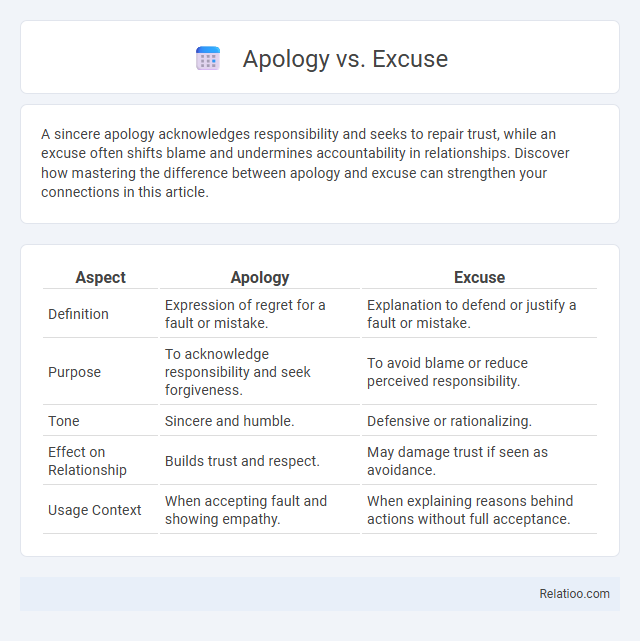A sincere apology acknowledges responsibility and seeks to repair trust, while an excuse often shifts blame and undermines accountability in relationships. Discover how mastering the difference between apology and excuse can strengthen your connections in this article.
Table of Comparison
| Aspect | Apology | Excuse |
|---|---|---|
| Definition | Expression of regret for a fault or mistake. | Explanation to defend or justify a fault or mistake. |
| Purpose | To acknowledge responsibility and seek forgiveness. | To avoid blame or reduce perceived responsibility. |
| Tone | Sincere and humble. | Defensive or rationalizing. |
| Effect on Relationship | Builds trust and respect. | May damage trust if seen as avoidance. |
| Usage Context | When accepting fault and showing empathy. | When explaining reasons behind actions without full acceptance. |
Understanding Apology and Excuse: Key Definitions
Understanding the key definitions of apology and excuse is essential for effective communication. An apology involves acknowledging responsibility for a mistake or wrongdoing and expressing regret, while an excuse aims to justify or explain the behavior without fully accepting fault. You can improve relationships by recognizing when to offer a sincere apology versus when an excuse might be appropriate.
The Psychology Behind Apologies
The psychology behind apologies reveals that genuine apologies foster empathy and trust by acknowledging wrongdoing and accepting responsibility, whereas excuses often serve as defense mechanisms to deflect blame and protect self-esteem. Effective apologies involve emotional regulation and perspective-taking, which promote social bonding and conflict resolution. Understanding these psychological dynamics helps differentiate sincere apologies from mere excuses, enhancing interpersonal communication and repairing relationships.
Motivations for Making Excuses
Motivations for making excuses often stem from a desire to avoid responsibility, protect self-esteem, or reduce potential blame in social or professional settings. Excuses are typically crafted to justify actions or failures without admitting fault, distinguishing them from apologies that express regret and acceptance of wrongdoing. Understanding these motivations reveals how individuals navigate accountability and interpersonal dynamics through different communicative strategies.
Apology vs Excuse: Core Differences
An apology acknowledges responsibility and expresses regret for a specific action or behavior, aiming to repair trust and demonstrate empathy. An excuse, on the other hand, tries to justify or explain the behavior, often deflecting blame or minimizing personal accountability. Understanding the core difference highlights that apologies foster reconciliation, while excuses may hinder genuine resolution.
Effects on Relationships and Trust
Apology restores trust by acknowledging responsibility and showing genuine remorse, which strengthens relationships through honesty and empathy. Excuses, however, often deflect blame and can undermine trust by appearing to avoid accountability, potentially weakening relational bonds. Your choice between offering an apology or an excuse significantly impacts the way others perceive your integrity and commitment to maintaining trust.
When Apologies Are More Effective Than Excuses
Apologies are more effective than excuses when taking responsibility for a mistake fosters trust and strengthens relationships, as they acknowledge wrongdoing without deflection. Expressing genuine regret through an apology demonstrates empathy and commitment to making amends, which is often valued in personal and professional settings. Excuses tend to undermine credibility by shifting blame, whereas a sincere apology promotes accountability and encourages resolution.
Common Pitfalls in Apologizing and Excusing
Common pitfalls in apologizing include offering insincere or vague apologies that fail to acknowledge the specific harm caused, which can undermine trust and resolution. Excuses often shift blame away from your responsibility, leading to perceptions of defensiveness rather than accountability. Understanding the distinction between an apology and an excuse helps you convey genuine remorse while avoiding justifications that dilute the sincerity of your message.
Cultural Perspectives on Apologies and Excuses
Cultural perspectives heavily influence how apologies and excuses are perceived and delivered, affecting social harmony and interpersonal relationships differently across societies. In many Asian cultures, apologies are often indirect and emphasize restoring harmony, while excuses might be used subtly to avoid loss of face, contrasting with Western cultures where direct apologies and explicit excuses are more common to demonstrate accountability. Understanding these cultural nuances can enhance Your communication skills and prevent misunderstandings in cross-cultural interactions.
How to Offer a Genuine Apology
Offering a genuine apology requires recognizing your responsibility in the mistake and expressing sincere regret without deflecting blame or making excuses. Your apology should include a clear acknowledgment of the impact of your actions, coupled with a commitment to rectify the situation and prevent recurrence. Genuine apologies enhance trust and repair relationships by demonstrating empathy and accountability beyond mere excuses or superficial statements.
Moving Forward: Building Accountability and Growth
Apology involves acknowledging wrongdoing and taking responsibility, while an excuse often deflects blame or minimizes fault, hindering genuine accountability. Moving forward requires sincere apologies that foster trust and promote personal growth through reflection and corrective actions. Emphasizing accountability nurtures stronger relationships and continuous improvement in both personal and professional contexts.

Infographic: Apology vs Excuse
 relatioo.com
relatioo.com